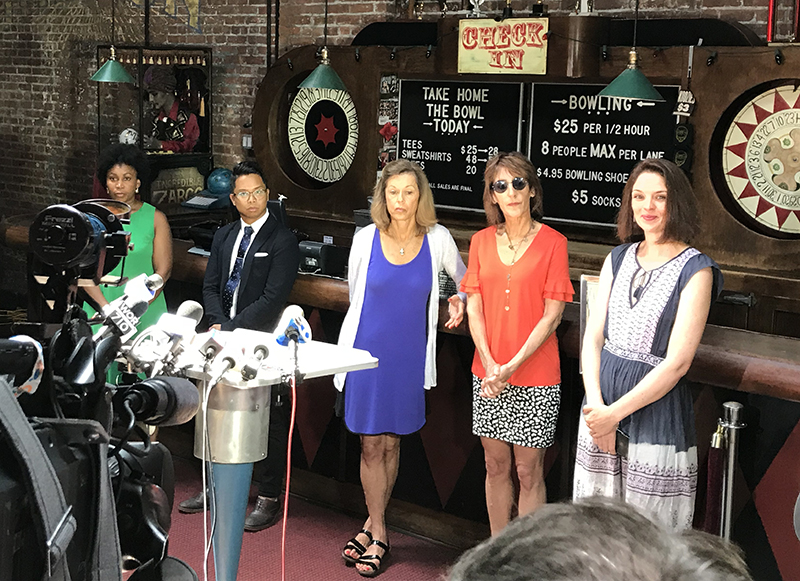
NYC cap on Uber, Lyft ‘A step in the wrong direction,’ advocates charge

Representatives of businesses and advocacy groups called out the New York City Council’s proposed cap on car services like Uber and Lyft on Thursday, saying it was “a step in the wrong direction” and would hurt the outer boroughs.
A package of bills limiting ride-sharing vehicles was introduced to the Council on Wednesday. One, sponsored by Councilmember Stephen Levin (D-Greenpoint, Brooklyn Heights), would require the Taxi and Limousine Commission to limit ride-share licenses for a year. Another would establish minimum wages for drivers. The TLC will submit recommendations at the end of the study period.
The popular ride-sharing services are under fire for making New York City’s congestion worse than ever and driving traditional cab drivers to the brink of bankruptcy.
The number of Uber, Lyft and other app-based cars has increased to almost 60,000, according to a 2017 study by Schaller Consulting. A cap on new licenses could reduce the number of ride-share cars on the street because of high driver turnover rates.
But ride-share advocates said on Thursday that a cap on new licenses would reduce rides to outer-borough neighborhoods, hurting businesses and cutting back on opportunities for minority drivers.
Sulma Arzu-Brown, director of operations for the NYC Hispanic Chamber of Commerce, said that it wasn’t long ago when yellow cab drivers refused to take customers to outer borough destinations.
“For us to get a ride now, it’s quick and easy,” Brown told the Brooklyn Eagle.
With ride-share service, community members “can participate in the overall vibrancy of New York City,” she said. “We don’t want to return to the pre-Uber days. We want to see all communities respected, with equal opportunities for all.”
While Brown feels for traditional taxi drivers, “The beauty of New York City economy is competition,” she said. There are many other opportunities “in so many areas” for cabbies who need other work, she said.
When the L-train Shuts Down
The cap on new licenses would hit neighborhoods like Greenpoint and Williamsburg particularly hard, local business owners said, because the upcoming L-train shutdown scheduled to begin in April will leave residents with less access to transportation.
The city expects the shutdown, which affects the L line between Brooklyn and Manhattan, to last about 15 months.
Felice Kirby, co-founder of Brooklyn Allied Bars and Restaurants, says north Brooklyn needs ride-share companies to take up the slack while the L train is out.
“We would ask the rideshare companies to ferry groups of pooled rides to the embarkation points for trains and buses to support mass transit,” Kirby said. “We’re looking for different pickup points, we’re looking for DOT to change some of the traffic patterns so that we do have good flow. And we support all thinking and modern ideas to address congestion in congested places. We just don’t think this is well thought out.”
Kirby said following the press conference that the ride-share limit would hit a younger, more savvy demographic.
“We’re talking about a demographic that uses their smart phones and wants to be able to pull in a ride, know where the driver is, see picture of the driver, see their license plate, have a trail of information. Why shouldn’t all the yellow cabs, green cabs, why shouldn’t everybody have a system like that?” Kirby said.
“It’s not our place to speak about how the industry should operate themselves, but we don’t think that taking away an existing resource in this manner makes sense at this time,” Kirby added.
Besides Arzu-Brown and Kirby, speakers at the press conference on Thursday, held at the Brooklyn Bowl in Williamsburg, included Bryan Lozano, Tech:NYC; Elaine Brodsky, North Brooklyn Chamber of Commerce and Courtenay Casey, National Sawdust.
Levin’s bill includes some wiggle room, with langue that would allow TLC to issue unlimited licenses which “would increase the availability of for-hire services in different geographic areas of the city where such services are needed, and where such licenses would not substantially contribute to traffic congestion.”
On Friday, Lyft issued a statement saying the bills “would take New York back to an era of standing on the corner and hoping to get a ride. Wait times would increase significantly and driver earnings and job opportunities would shrink. Worst of all, the proposals prioritize corporate medallion owners above the overwhelming majority of New Yorkers.”
Lyft said it was prepared to support an industry commitment to a $100 million hardship fund “to assist individual medallion owner-operators who are in financial pain.”
Leave a Comment
Leave a Comment



